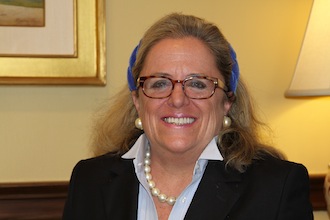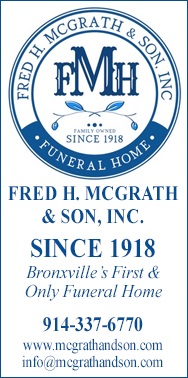From the Mayor: Pay Attention to Six Amendments on November 5 Ballot

Oct. 9, 2013: The New York State Legislature has proposed six constitutional amendments that will appear on the November 5 ballot. Though often ignored in relation to election for office holders, because voters often do not cast ballots for topics they have not studied, the amendment changes do have lasting impact.
Like most state constitutions, New York's provisions tend to be more detailed than those in its federal counterpart and therefore amended more often. There have been 220 amendments to the current constitution since 1895. Because constitutions protect fundamental rights and define core governmental structures, they are logically harder to amend than ordinary laws.
To change the New York State Constitution, both chambers of the legislature in successive legislative sessions must approve the proposed amendment by a simple majority vote. It is then referred to the New York State attorney general, who is required to provide a written opinion as to how the proposed amendment language meshes with other provisions of the constitution. If voters, after a general statewide vote, approve the amendment by a simple majority vote, it becomes part of the constitution on January 1. The governor has no formal role in this process.
Proposed First Amendment: The first amendment allowing an expansion of casino gambling has dwarfed all others in attention and a great fall off in votes is expected on the other issues. In addition to the five casinos run by Indian tribes and the nine state-run racinos, the proposed amendment would add a maximum of seven full-scale casinos, most located north of Albany. Proponents of the amendment believe casinos that will provide tourism and good jobs and will increase revenue currently lost to Connecticut and New Jersey and that the constitutional provision that limits the growth to seven will curb their proliferation. Opponents argue that expanding casino gambling increases gambling addiction and has harmful effects on the casino communities, including increased crime.
Note: In a very interesting divergence, the casino amendment is the only one with one-sided positive wording stating that approval would be "for the legislated purposes of promoting job growth, increasing aid to schools, and permitting local governments to lower property taxes." This is a clear departure from the non-judgmental bone-dry language always employed in proposed amendments. How this passed muster with the ultimate arbiter, the state board of elections, remains a mystery.
Proposed Second Amendment: Amendment Two would allow veterans who were disabled in combat to get more "points" when competing for jobs within the civil service system. Because it alters the civil service law, the change has to come via a constitutional amendment. Those in favor of the change argue that the amendment would not only increase employment opportunities for disabled veterans, but would also put their training and experience to work for state and local governments. Currently, there is no expressed opposition to this change.
Proposed Third Amendment: Amendment Three would allow local governments to exceed their long-term debt limits if the money is used for sewage improvements. This exemption began in 1963 and has been extended every ten years since. The genesis of the 1963 amendment was to encourage municipalities to participate in a then-new state sewer construction plan without impairing the financing of other needed capital improvements. Since pollution concerns continue as well as the need to constantly maintain and upgrade sewage treatment systems, this amendment appears to be universally non-controversial.
Next Two Proposed Amendments: The next two amendments (amendments four and five) address land within the Adirondack Parks and the New York State Constitution via the "forever-wild" clause, which forbids the lease, sale, exchange, or taking of forest preserve land without a constitutional change.
The proposed fourth amendment would settle a century-old private-public dispute over 200 parcels near Raquette Lake. Proponents of the amendment believe it will finally settle a long-standing and costly dispute and in the end, in a land trade, will actually add significantly to the Adirondack Preserve. Opponents believe such disputes should be resolved via the judicial system and not a constitutional change, setting a very poor precedent for this type of dispute resolution going forward.
The proposed fifth amendment would authorize a land swap with a private company, NYCO Minerals of Willsboro, to expand its current wollastonite mine (a mineral used in paints, plastics, and auto parts). The current mine has only three to four years of material remaining. In exchange for mining on adjoining property, which would extend company operations by eight to ten years, upon completion the land would be donated back to the state. Proponents argue a "yes" vote would preserve jobs in a very depressed area and eventually leave New York with more preserved park land. Opponents fear that a dangerous precedent would be set as a constitutional revision is undertaken for private gain and not a clear public purpose. They also argue that alternatives on NYCO’s current private property are viable.
Proposed Sixth Amendment: The final proposed amendment would increase to 80 from 70 the maximum age supreme court and appeals court justices could stay on the bench. Proponents believe that the services of experienced, dedicated judges is being lost to a retirement matrix that does not reflect current life expectancies. Opponents argue conversely that the current retirement rule encourages fresh ideas, healthy turnover, and diversity.
Net-net, the more umbrella issue is whether the above issues are truly worthy of state-wide constitutional amendment versus less expensive ways of adjudication or change.
Financial & Legal Assistance Directory
Hymes & Associates, CPA, P.C.
Our firm provides outstanding service to our clients because of our dedication to the three underlying principles of professionalism, responsiveness, and quality.
Listed as one of the 10 largest firms by The Westchester Business Journal, we serve clients throughout the tri-state area. By combining our expertise, experience, and
the energy of our staff, each client receives close, personal and professional attention.
Our high standards, service, and specialized staff spell the difference between our outstanding performance and other firms. We make sure that every client
is served by the expertise of our whole firm.
Hymes & Associates, CPA, P.C.
55 Pondfield Road
Bronxville, NY 10708
914-961-1200
914-961-1715 (Fax)
Website: www.hymescpa.com
Baillie & Hershman
44 Pondfield Road, Suite - 12
Bronxville, N.Y. 10708
Office: 914-337-6300
Matthew W. Kerner, ESQ.
Direct Dial: 914-337-6569
Email: This email address is being protected from spambots. You need JavaScript enabled to view it.
Fax: 914-337-6913
Suzanne M. Bloomer, Esq.
Direct Dial: 914-337-0142
This email address is being protected from spambots. You need JavaScript enabled to view it.
Baillie & Hershman provides comprehensive Real Estate legal services for buyers, sellers, current owners, real estate agents and lenders. We also handle estate planning, including the drafting of wills.
Griffin, Coogan, Sulzer & Horgan, P.C.
Attorneys and Counselors at Law
Griffin, Googan, Sulzer & Horgan, R.C.
Located in Bronxville, New York, Griffin, Coogan, Sulzer & Horgan, P.C. takes great pride in providing our clients with comprehensive, high quality legal services in a responsive manner. The firm concentrates its practice in real estate law with a primary focus on issues relating to real estate tax litigation (also known as tax certiorari), real estate transactions, valuation law, real property taxation and tax planning and real property tax exemption matters throughout New York State.
The firm serves as general counsel for several local cooperatives and represents clients in various issues relating to wills, trusts and estate planning.
51 Pondfield Road
Bronxville, NY 10708
(914) 961-1300
This email address is being protected from spambots. You need JavaScript enabled to view it.
Nobile, Magarian & DiSalvo LLP
We are hardworking and dedicated attorneys who, combined, have more than 150 years of experience delivering quality legal advice. Our cutting edge is our ability to enter both the conference room and the courtroom with strength. Our law firm provides legal representation and counsel for both individual and business clients on issues related to estate planning and administration, real estate law, litigation, and business law. Our practice areas include: Commercial Litigation, Business Law, Real Estate, Wills, Estate Planning, Trusts, Estate Administration, Living Wills, Health Care Proxies, Powers of Attorney, Not For Profits, and Employment Law.
111 Kraft Avenue
Bronxville, NY 10708
914-337-6300
Veneruso, Curto, Schwartz & Curto, LLP
Veneruso, Curto, Schwartz & Curto is dedicated to providing businesses and individuals with exceptional legal services customized to each client's needs and objectives. Practice areas include litigation, real estate, not for profit, wills and estate planning, land use and zoning, business and corporate, cooperative and condominium and real estate tax assessment litigation.
The Hudson Valley Bank Building
35 East Grassy Sprain Road, Suite 400
Yonkers, New York 10710
914-779-1100
Aegis Capital
Steve brings 40 years of investing experience to his role as Senior Managing Director at Aegis Capital Corp., a prominent national securities firm.












